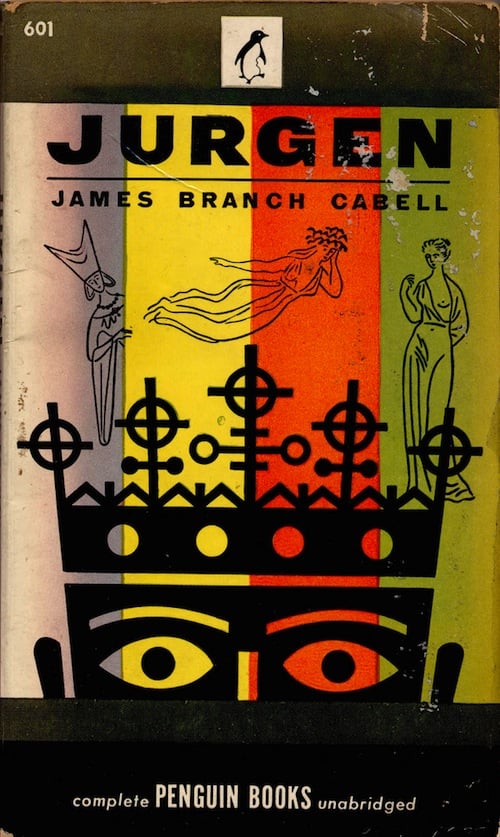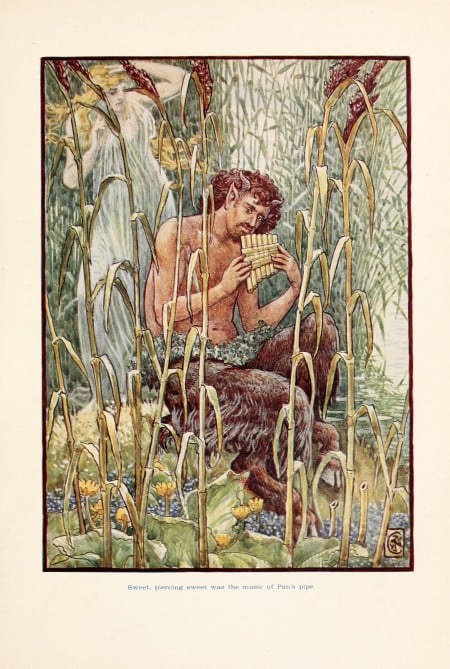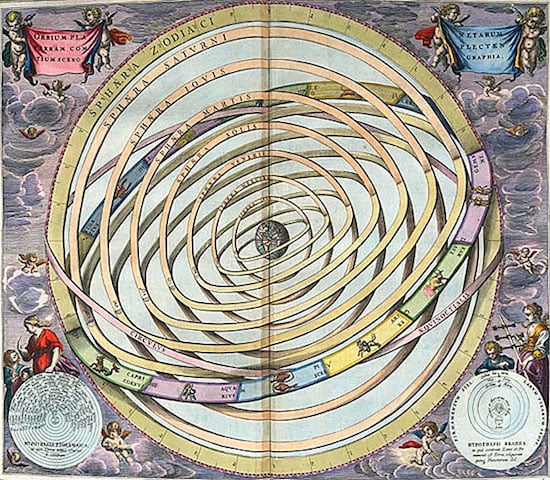Jurgen (20)
By:
July 26, 2015

James Branch Cabell’s 1919 ironic fantasy novel Jurgen, A Comedy of Justice, the protagonist of which seduces women everywhere he travels — including into Arthurian legend and Hell itself — is (according to Aleister Crowley) one of the “epoch-making masterpieces of philosophy.” Cabell’s sardonic inversion of romantic fantasy was postmodernist avant la lettre. HiLoBooks is pleased to serialize Jurgen here at HILOBROW. Enjoy!
Early in the following morning Jurgen left Cameliard, traveling toward Carohaise, and went into the Druid forest there, and followed Merlin’s instructions.
“Not that I for a moment believe in such nonsense,” said Jurgen: “but it will be amusing to see what comes of this business, and it is unjust to deny even nonsense a fair trial.”
So he presently observed a sun-browned brawny fellow, who sat upon the bank of a stream, dabbling his feet in the water, and making music with a pipe constructed of seven reeds of irregular lengths. To him Jurgen displayed, in such a manner as Merlin had prescribed, the token which Merlin had given. The man made a peculiar sign, and rose. Jurgen saw that this man’s feet were unusual.

Jurgen bowed low, and he said, as Merlin had bidden: “Now praise be to thee, thou lord of the two truths! I have come to thee, O most wise, that I may learn thy secret. I would know thee, and would know the forty-two mighty ones who dwell with thee in the hall of the two truths, and who are nourished by evil-doers, and who partake of wicked blood each day of the reckoning before Wennofree. I would know thee for what thou art.”
The brown man answered: “I am everything that was and that is to be. Never has any mortal been able to discover what I am.”
Then this brown man conducted Jurgen to an open glen, at the heart of the forest.
“Merlin dared not come himself, because,” observed the brown man, “Merlin is wise. But you are a poet. So you will presently forget that which you are about to see, or at worst you will tell pleasant lies about it, particularly to yourself.”
“I do not know about that,” says Jurgen, “but I am willing to taste any drink once. What are you about to show me?”
The brown man answered: “All.”
So it was near evening when they came out of the glen. It was dark now, for a storm had risen. The brown man was smiling, and Jurgen was in a flutter.
“It is not true,” Jurgen protested. “What you have shown me is a pack of nonsense. It is the degraded lunacy of a so-called Realist. It is sorcery and pure childishness and abominable blasphemy. It is, in a word, something I do not choose to believe. You ought to be ashamed of yourself!”
“Even so, you do believe me, Jurgen.”
“I believe that you are an honest man and that I am your cousin: so there are two more lies for you.”
The brown man said, still smiling: “Yes, you are certainly a poet, you who have borrowed the apparel of my cousin. For you come out of my glen, and from my candor, as sane as when you entered. That is not saying much, to be sure, in praise of a poet’s sanity at any time. But Merlin would have died, and Merlin would have died without regret, if Merlin had seen what you have seen, because Merlin receives facts reasonably.”

“Facts! sanity! and reason!” Jurgen raged: “why, but what nonsense you are talking! Were there a bit of truth in your silly puppetry this world of time and space and consciousness would be a bubble, a bubble which contained the sun and moon and the high stars, and still was but a bubble in fermenting swill! I must go cleanse my mind of all this foulness. You would have me believe that men, that all men who have ever lived or shall ever live hereafter, that even I am of no importance! Why, there would be no justice in any such arrangement, no justice anywhere!”
“That vexed you, did it not? It vexes me at times, even me, who under Koshchei’s will alone am changeless.”
“I do not know about your variability: but I stick to my opinion about your veracity,” says Jurgen, for all that he was upon the verge of hysteria. “Yes, if lies could choke people that shaggy throat would certainly be sore.”
Then the brown man stamped his foot, and the striking of his foot upon the moss made a new noise such as Jurgen had never heard: for the noise seemed to come multitudinously from every side, at first as though each leaf in the forest were tinily cachinnating; and then this noise was swelled by the mirth of larger creatures, and echoes played with this noise, until there was a reverberation everywhere like that of thunder. The earth moved under their feet very much as a beast twitches its skin under the annoyance of flies. Another queer thing Jurgen noticed, and it was that the trees about the glen had writhed and arched their trunks, and so had bended, much as candles bend in very hot weather, to lay their topmost foliage at the feet of the brown man. And the brown man’s appearance was changed as he stood there, terrible in a continuous brown glare from the low-hanging clouds, and with the forest making obeisance, and with shivering and laughter everywhere.
“Make answer, you who chatter about justice! how if I slew you now,” says the brown man, — “I being what I am?”
“Slay me, then!” says Jurgen, with shut eyes, for he did not at all like the appearance of things. “Yes, you can kill me if you choose, but it is beyond your power to make me believe that there is no justice anywhere, and that I am unimportant. For I would have you know I am a monstrous clever fellow. As for you, you are either a delusion or a god or a degraded Realist. But whatever you are, you have lied to me, and I know that you have lied, and I will not believe in the insignificance of Jurgen.”
Chillingly came the whisper of the brown man: “Poor fool! O shuddering, stiff-necked fool! and have you not just seen that which you may not ever quite forget?”
“None the less, I think there is something in me which will endure. I am fettered by cowardice, I am enfeebled by disastrous memories; and I am maimed by old follies. Still, I seem to detect in myself something which is permanent and rather fine. Underneath everything, and in spite of everything, I really do seem to detect that something. What rôle that something is to enact after the death of my body, and upon what stage, I cannot guess. When fortune knocks I shall open the door. Meanwhile I tell you candidly, you brown man, there is something in Jurgen far too admirable for any intelligent arbiter ever to fling into the dustheap. I am, if nothing else, a monstrous clever fellow: and I think I shall endure, somehow. Yes, cap in hand goes through the land, as the saying is, and I believe I can contrive some trick to cheat oblivion when the need arises,” says Jurgen, trembling, and gulping, and with his eyes shut tight, but even so, with his mind quite made up about it. “Of course you may be right; and certainly I cannot go so far as to say you are wrong: but still, at the same time —”
“Now but before a fool’s opinion of himself,” the brown man cried, “the Gods are powerless. Oh, yes, and envious, too!”
And when Jurgen very cautiously opened his eyes the brown man had left him physically unharmed. But the state of Jurgen’s nervous system was deplorable.
Footnotes from Notes on Jurgen (1928), by James P. Cover — with additional comments from the creators of this website; rewritten, in some instances, by HiLoBooks.
* The Brown Man — In this chapter The Brown Man closely resembles Pan, the Grecian god of plants and fields, whose unseen presence caused “Panic fear.” But in The High Place and Something About Eve, he clearly becomes the everlasting spirit of evil in the world, the “adversary of all the gods of men,” whom Christians call Satan. In connection with this episode on Jurgen’s life it is interesting to read “The Great God Pan” in Arthur Machen’s The House of Souls.
* Wennofree — The allusion here seems to be to Egyptian theories of what became of the soul after death. The “two truths,” for those who are eager for such unblushing veracity, are further elucidated in Part Five of Something About Eve.
RADIUM AGE SCIENCE FICTION: “Radium Age” is HILOBROW’s name for the 1904–33 era, which saw the discovery of radioactivity, the revelation that matter itself is constantly in movement — a fitting metaphor for the first decades of the 20th century, during which old scientific, religious, political, and social certainties were shattered. This era also saw the publication of genre-shattering writing by Edgar Rice Burroughs, Sax Rohmer, E.E. “Doc” Smith, Jack London, Arthur Conan Doyle, Aldous Huxley, Olaf Stapledon, Karel Čapek, H.P. Lovecraft, Charlotte Perkins Gilman, Yevgeny Zamyatin, Philip Gordon Wylie, and other pioneers of post-Verne/Wells, pre-Golden Age “science fiction.” More info here.
READ GORGEOUS PAPERBACKS: HiLoBooks has reissued the following 10 obscure but amazing Radium Age science fiction novels in beautiful print editions: Jack London’s The Scarlet Plague, Rudyard Kipling’s With the Night Mail (and “As Easy as A.B.C.”), Arthur Conan Doyle’s The Poison Belt, H. Rider Haggard’s When the World Shook, Edward Shanks’ The People of the Ruins, William Hope Hodgson’s The Night Land, J.D. Beresford’s Goslings, E.V. Odle’s The Clockwork Man, Cicely Hamilton’s Theodore Savage, and Muriel Jaeger’s The Man with Six Senses. For more information, visit the HiLoBooks homepage.
SERIALIZED BY HILOBOOKS: Jack London’s The Scarlet Plague | Rudyard Kipling’s With the Night Mail (and “As Easy as A.B.C.”) | Arthur Conan Doyle’s The Poison Belt | H. Rider Haggard’s When the World Shook | Edward Shanks’ The People of the Ruins | William Hope Hodgson’s The Night Land | J.D. Beresford’s Goslings | E.V. Odle’s The Clockwork Man | Cicely Hamilton’s Theodore Savage | Muriel Jaeger’s The Man With Six Senses | Jack London’s “The Red One” | Philip Francis Nowlan’s Armageddon 2419 A.D. | Homer Eon Flint’s The Devolutionist | W.E.B. DuBois’s “The Comet” | Edgar Rice Burroughs’s The Moon Men | Charlotte Perkins Gilman’s Herland | Sax Rohmer’s “The Zayat Kiss” | Eimar O’Duffy’s King Goshawk and the Birds | Frances Hodgson Burnett’s The Lost Prince | Morley Roberts’s The Fugitives | Helen MacInnes’s The Unconquerable | Geoffrey Household’s Watcher in the Shadows | William Haggard’s The High Wire | Hammond Innes’s Air Bridge | James Branch Cabell’s Jurgen | John Buchan’s “No Man’s Land” | John Russell’s “The Fourth Man” | E.M. Forster’s “The Machine Stops” | John Buchan’s Huntingtower | Arthur Conan Doyle’s When the World Screamed | Victor Bridges’ A Rogue By Compulsion | Jack London’s The Iron Heel | H. De Vere Stacpoole’s The Man Who Lost Himself | P.G. Wodehouse’s Leave It to Psmith | Richard Connell’s “The Most Dangerous Game” | Houdini and Lovecraft’s “Imprisoned with the Pharaohs” | Arthur Conan Doyle’s “The Sussex Vampire.”
ORIGINAL FICTION: HILOBROW has serialized three novels: James Parker’s The Ballad of Cocky The Fox (“a proof-of-concept that serialization can work on the Internet” — The Atlantic); Karinne Keithley Syers’s Linda Linda Linda (which includes original music); and Robert Waldron’s roman à clef The School on the Fens. We also publish original stories and comics. These include: Matthew Battles’s stories “Gita Nova“, “Makes the Man,” “Imago,” “Camera Lucida,” “A Simple Message”, “Children of the Volcano”, “The Gnomon”, “Billable Memories”, “For Provisional Description of Superficial Features”, “The Dogs in the Trees”, “The Sovereignties of Invention”, and “Survivor: The Island of Dr. Moreau”; several of these later appeared in the collection The Sovereignties of Invention | Peggy Nelson’s “Mood Indigo“, “Top Kill Fail“, and “Mercerism” | Annalee Newitz’s “The Great Oxygen Race” | Flourish Klink’s Star Trek fanfic “Conference Comms” | Charlie Mitchell’s “A Fantasy Land” | Charlie Mitchell’s “Sentinels” | Joshua Glenn’s “The Lawless One”, and the mashup story “Zarathustra vs. Swamp Thing” | Adam McGovern and Paolo Leandri’s Idoru Jones comics | John Holbo’s “Sugarplum Squeampunk” | “Another Corporate Death” (1) and “Another Corporate Death” (2) by Mike Fleisch | Kathryn Kuitenbrouwer and Frank Fiorentino’s graphic novel “The Song of Otto” (excerpt) | John Holbo’s graphic novel On Beyond Zarathustra (excerpt) | “Manoj” and “Josh” by Vijay Balakrishnan | “Verge” by Chris Rossi, and his audio novel Low Priority Hero | EPIC WINS: THE ILIAD (1.408-415) by Flourish Klink | EPIC WINS: THE KALEVALA (3.1-278) by James Parker | EPIC WINS: THE ARGONAUTICA (2.815-834) by Joshua Glenn | EPIC WINS: THE MYTH OF THE ELK by Matthew Battles | TROUBLED SUPERHUMAN CONTEST: Charles Pappas, “The Law” | CATASTROPHE CONTEST: Timothy Raymond, “Hem and the Flood” | TELEPATHY CONTEST: Rachel Ellis Adams, “Fatima, Can You Hear Me?” | OIL SPILL CONTEST: A.E. Smith, “Sound Thinking | LITTLE NEMO CAPTION CONTEST: Joe Lyons, “Necronomicon” | SPOOKY-KOOKY CONTEST: Tucker Cummings, “Well Marbled” | INVENT-A-HERO CONTEST: TG Gibbon, “The Firefly” | FANFICTION CONTEST: Lyette Mercier’s “Sex and the Single Superhero”
